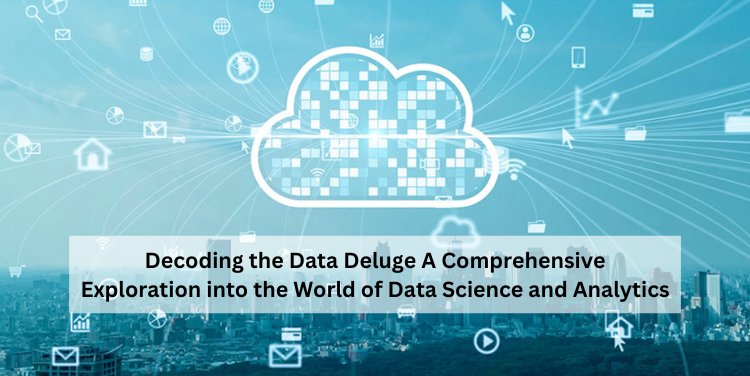Decoding the Data Deluge: A Comprehensive Exploration into the World of Data Science and Analytics

In the fast-evolving landscape of technology, one field has emerged as a beacon of innovation and insight: Data Science and Analytics. In today's digital age, where every click, transaction, and interaction generates data, harnessing the power of this information has become imperative for businesses and organizations seeking a competitive edge. This blog will explore the fascinating world of data science and analytics, unraveling its complexities and highlighting its transformative potential.
Understanding the Basics: What is Data Science?
At its core, data science is the art and science of extracting meaningful insights from raw data. It encompasses a range of techniques, including statistical analysis, machine learning, data visualization, and predictive modeling. The goal? To uncover patterns, trends, and correlations that can inform strategic decision-making.
The Pillars of Data Science:
1. Data Collection:
Gathering relevant and diverse data sets is the foundation of any data science endeavor. Whether structured or unstructured, the quality and quantity of data play a crucial role in the accuracy of the insights derived.
2. Data Cleaning and Preprocessing:
Raw data is often messy, incomplete, or riddled with errors. Data scientists engage in the crucial task of cleaning and preprocessing, ensuring that the data is ready for analysis.
3. Exploratory Data Analysis (EDA):
EDA involves visualizing and summarizing data to gain a deeper understanding of its characteristics. This step often reveals hidden patterns and outliers, guiding subsequent analysis.
4. Machine Learning:
Machine learning algorithms, a subset of artificial intelligence, allow computers to learn from data and make predictions or decisions. From regression models to deep learning, these tools enable businesses to automate processes and make data-driven predictions.
5. Data Visualization:
Communicating findings effectively is as crucial as the analysis itself. Data visualization tools help transform complex insights into clear, comprehensible visuals, aiding decision-makers in understanding and acting upon the results.
Applications of Data Science and Analytics:
1. Business Intelligence:
Businesses leverage data analytics to gain insights into customer behavior, market trends, and operational efficiency. This information empowers them to make informed decisions, optimize processes, and stay ahead of the competition.
2. Healthcare and Predictive Analytics:
In the healthcare sector, data science is revolutionizing patient care. Predictive analytics can forecast disease outbreaks, optimize treatment plans, and enhance the overall efficiency of healthcare systems.
3. Financial Forecasting:
Financial institutions use data science for risk management, fraud detection, and investment strategies. Predictive modeling helps anticipate market trends and guide investment decisions.
4. Personalization in E-commerce:
E-commerce platforms leverage data to provide personalized recommendations, enhance user experience, and optimize marketing strategies.
Challenges and Ethical Considerations:
While the benefits of data science are undeniable, it's essential to address the challenges and ethical considerations associated with handling vast amounts of sensitive information. Issues such as data privacy, bias in algorithms, and transparency in decision-making processes require careful consideration and responsible practices.
The Future of Data Science:
As technology continues to advance, the role of data science and analytics will only become more integral to our lives. From the rise of edge computing to the ethical implications of artificial intelligence, staying abreast of the latest trends and developments is crucial for professionals in this field.
In the age of information, data science and analytics have emerged as indispensable tools for businesses and organizations striving to thrive in a data-driven world. From uncovering hidden patterns to guiding strategic decision-making, the applications of data science are diverse and impactful. As we navigate the data universe, the key lies in responsible practices, ethical considerations, and a commitment to harnessing the power of data for positive change. The journey into the world of data science is an exciting one, full of challenges and opportunities that promise to shape the future of technology and decision-making.
What's Your Reaction?















